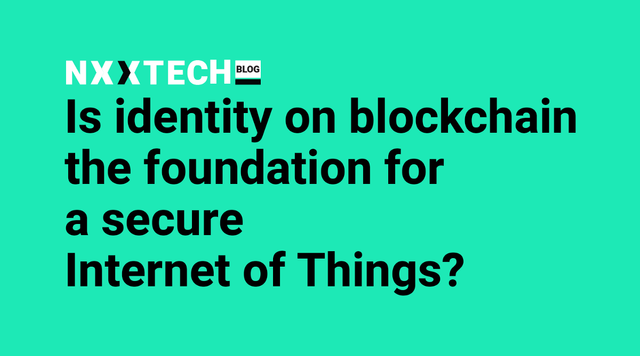Is identity on blockchain the foundation for a secure Internet of Things?
From identity management on blockchain to the network of identified things: Nxxtech is enabling a peer-to-peer relationship between devices, which can be possible without the need of a central authority.

The fact that 90% of the data in the world today has been created in the last two years alone is truly mind-bending. Virtually every device we own has an access to the Internet, enabling us to exchange texts, documents, photographs and other digital value, every day, anytime, everywhere. To get an idea of just how much data that we generate, check this insightful Domo.com infographic.
The IoT has advanced to a level where the potential of billions of network devices is a real possibility. However, the Internet was not designed for this type of challenges, and myriad of interactions and data venues represent ever more demanding financial and structural challenges for the entire ecosystem. We've covered this topic in our previous blogs, so you're invited to read them.
The basic premise for users to exchange information online is trust, meaning we use our free will to decide whether another person is trustworthy, but generate passwords, use certificates or choose between a variant of other options to interact with others in a secure manner. Wouldn’t it be better to establish a system that would allow us to use a unique identity across all interactions we make? And, what do our devices have to do with that?
In the current era of the internet, users have many connected devices, belonging to different manufacturers, meaning we are literary forced to generate and use different user accounts. This brings us to the most important aspect Nxxtech solves: all solutions today are focused on the users (or more precisely, on their data), and not on the growing number of the devices they possess. This is the reason none of the approaches today can bring satisfactory results as it doesn’t solve the issue of user identity on all different devices a person uses.
On an exponentially growing market in which devices are deployed in different ways, there is no single networking technology that would fit them all. There is an obvious reason: the providers wish as many users as possible on their system and therefore lack the motivation for a unified standard. However, the retention of digital identities is not only a challenge, but a real security hole! And, it means that our digital identity and our digital footprint is ever fluid and changing. To learn more on the subject, go through Nxxtech whitepaper.
However, blockchain is enabling users to manage and validate information tied to their identity without the need for a centralized repository. Using a blockchain identity application (such as NxxtechID) we will be able to temporarily grant access to those chunks of our personal information we choose to share. To see the NxxtechID in action check our short demo:
What is more, Nxxtech believes digital identity is something we can not only tie to the users, but to devices also.
Nxxtech solves the issue of digital identity on protocol level through trustless networking. The devices can generate their own identity, securing their authentication and encryption through blockchain. That is how they are able to interact and exchange value directly machine-to-machine.
Namely, private blockchain offers them a degree of control over participating nodes (e.g. users) and the transaction verification process, meaning it uses identity to confirm membership and access privileges. We're basically extending traditional identity and its access management to blockchain nodes and automating it along the way.
We believe this is a superior solution to those existing today, ready to secure connected things at a scale. And, we would love to hear your thoughts on the future of communication in the connected world!
Reach out through form on our website or social media channels (Twitter, LinkedIn, Steemit or Reddit). Don’t forget to read our whitepaper.

https://www.nxxtech.com/docs/Nxxtech_Whitepaper_Version_0.1.pdf
To the question in your title, my Magic 8-Ball says:
Hi! I'm a bot, and this answer was posted automatically. Check this post out for more information.